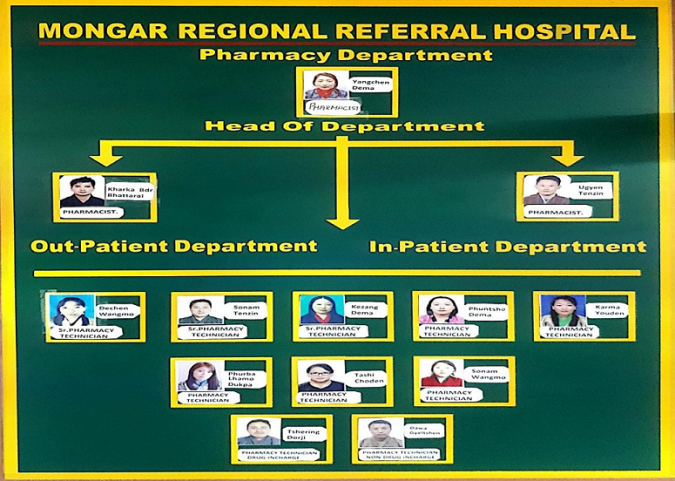
BACKGROUND:
Pharmacy department collaborates with other health profession to promote improved health care complying with good pharmacy practice as per the national policies. The department consists of inpatient, outpatient and pharmaceutical store to ensure efficient pharmaceutical care in the hospital. In an average outpatient pharmacy dispenses medicines to about 250 patients in a day. Inpatient pharmacy carries out daily dosing in nine inpatient wards and professional monitoring of drug chart. At present hospital have three Pharmacist and ten pharmacy technician.
TIMING:
Monday to Friday – 9:00 AM – 3:00 PM (morning)
3:00 PM- 8:00 PM (Evening)
Saturday – 9:00 AM – 1:00 PM (morning)
1:00 PM to 8:00 PM (evening)
Emergency pharmacy is open from 9:00 AM -8:00 PM even on Sunday and government holidays.
Mission:
The overall mission of the Pharmacy department is to serve society as the profession responsible for the appropriate use of medications, devices and services to achieve optimal therapeutic outcome with high quality patient care in an environment of professionalism, respect and effective communication.
Vision:
The Department of Pharmacy will provide optimal patient care and improve patient outcomes adhering with rational use of medicine and good pharmacy practice. Employees will work together to create an exceptional work environment.
Objectives:
To fulfill the above mission, the department has following board objectives:
- To provide effective medication therapy management.
- To maintain and improve professional performance.
- To prepare, obtain, store, secure, distribute, administer, dispense and dispose of pharmaceutical product.
- To provide drug information to all the patients and the health personnel.
Service provided:
Outpatient pharmacy Care:
Patient care is the most important responsibility of the department. In line with the Good Dispensing Practices, the outpatient pharmacy provide patient counseling, and ensure that appropriate medicines are prescribed and dispensed appropriately so that patient can get maximum benefit with minimal side effects. This department involves all discipline to provide a functional and accurate method of medication dispensing, preparation, administration, proper storage, packaging, labeling, distribution and record keeping of medication, in compliance with the Medicines Act of the Kingdom of Bhutan 2003.
Inpatient pharmacy care:
It’s very important that inpatient pharmacy to collaborate with the members of health care team, patient and their caregivers to provide efficient patient care services. Pharmacist and pharmacy technician deliver pharmaceutical care in wards under direct supervision like daily dosing in wards and discharge medication to seriously ill patient. Inpatient pharmacy monitors drug chart and patient adherence to medicines in the wards to achieve maximum therapeutic benefit.
Pharmaceutical store Management:
The department is responsible for ensuring that all the vital and essential medicines and medical devices are available throughout the year. Further the department supervises the overall use of medicines in the ward and the outpatient and mobilization of excess and short expiry drugs.
Pharmacovigilance center:
PHARMACOVIGILANCE is defined as the science and activities relating to detection, assessment, understanding and prevention of adverse effects or any other drug related problems. Pharmacy department is recognized as Eastern Regional Pharmacovigilance Centre since 2015 by National pharmacovigilance center (DRA).The World Health Organization defines Adverse Drug Reaction (ADR) as a reaction to a drug, which is noxious and unintended, and which occurs at doses normally used in man for prophylaxis, diagnosis, or therapy of disease, or for the modification of physiological function. ADR reporting/monitoring is important for post-marketing drug safety surveillance. we do report Adverse drug reaction via VigiFlow, World Health Organization web based to Centre Pharmacovigilance I,e. Drug Regulatory Authority of Bhutan. All the patients and health professionals can report the information to the Pharmacist, if encounter with adverse events. Department do Sensitize patients and healthcare Professional on Adverse Drug reaction and its reporting procedure.
Promoting Rational Use of Drugs:
The department is involved in promoting rational use of medicines mostly through educative means.
The department conducts prescription survey daily and submits to EMTD at the end of every month. To ensure effective use and avoid misuse of controlled medicines in hospital, department carry out weekly monitoring of controlled drug in the wards and OPD. To supplement the national essential list and to ensure cost-effective and timely treatment for specialized needs of patient, department manages the rational use of named-patient medicines without compromising the quality of patient care.
Drug Information:
The Pharmacist and pharmacy technicians endeavor to provide support for the physicians, nurses, and other departments of the hospital in matters regarding medications, and serve as a resource of drug information to those who prescribe, administer and consume medications. The department also updates weekly status of the availability of medicines and non drugs in the health care facility.
Medication-Reconciliation.
WHO prioritize medication reconciliation as one of the top patient safety goals. To reduce preventable medication error and to avoid unintentional discrepancies, Pharmacy department compares patient medication order to all the medication history of the patient and intervene on patient oriented pharmaceutical care. To optimize the therapeutic need and safety of the patient, reconciliation is done on drug contraindication in certain patient, drug interaction, medication error and medication adherence of the patient.
